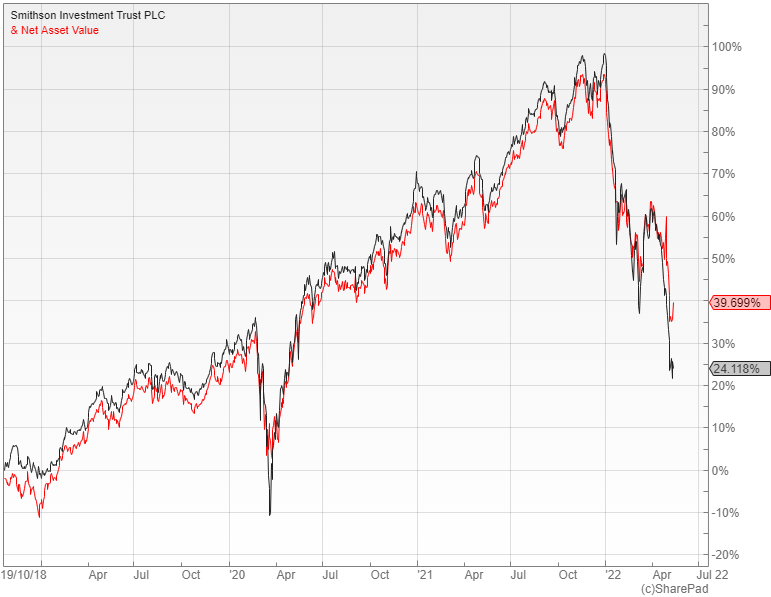Smithson: Keep calm and carry on regardless

It has been a brutal few month’s for Terry Smith’s popular investment trust with the sharp increase in bond yields undermining its growth-oriented holdings, but the managers are sticking to their long-term approach.
The £2.4bn Smithson Investment Trust (LON: SSON) was launched in October 2018and invests in a concentrated global portfolio of small and mid-sized companies worth between £500m and £15bn at time of purchase. It takes a long-term view and typically has just 25 to 40 separate positions.
For the first few years the performance was excellent, with the low bond yields helping its shares to appreciate from an issue price of £10 to more than double to an all-time high of £20.40 late in 2021. The resurgence of inflation and subsequent increase in bond yields has had a dramatic effect though, with the shares dropping back to £12.65 at time of writing.
Higher yields reduce the net present value of future cash flows and have a particularly hard impact on growth stocks whose profits are forecast to increase in the years ahead. The change in sentiment can be seen from the trust’s de-rating from premium to discount, with Smithson shares currently available ten percent below their underlying NAV.
Long-term approach
The managers target companies that they believe can compound in value over many years. This means looking for small and mid-sized stocks that exhibit strong profitability that is sustainable over time and generates substantial cash flow that can be reinvested back into the business.
They avoid companies with high debt, as well as sectors and industries that innovate very quickly and are rapidly changing. The preference is for stocks that can continue to outperform their competitors via intangible assets in areas such as information technology, health care and consumer goods.
At the end of April the portfolio consisted of 32 separate positions with the top ten including the likes of Sabre, Temenos, Rightmove, Fevertree Drinks and Verisk Analytics. The largest sector weighting was the 45.8% in information technology, with the main country exposures being the US at 44.3% and the UK at 19.4%.
Carry on regardless
The managers provided an update at the company’s recent AGM in which they said that the key issues affecting the stock market in the first quarter were: inflation, rising interest rate expectations and fears of a recession. In this environment the sectors where they were most heavily invested – information technology, industrials, consumer discretionary and health care – were also the four worst performers.
Despite this they stressed that their strategy of buying good companies, not overpaying and then doing nothing will not change. By way of justification they highlighted the far better return-on-capital-employed, gross margin, operating profit margin, cash conversion rate and interest cover that their portfolio offers compared to the MSCI benchmark.
The next few months are likely to provide a real test of nerve for investors in the fund, as if inflation remains high and interest rate expectations increase further then the shares are likely to come under even more pressure. It really all comes down to how you think this process will end, because if the threat of recession forces the central banks to backtrack then these sorts of portfolios should bounce back sharply.

Comments (0)